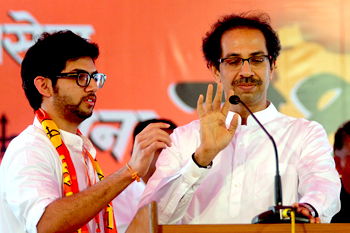Mumbai, Mar 12: Continuing its diatribe against ally BJP, the Shiv Sena today said it abstained from voting for the "anti-farmer" Land Acquisition Bill in Lok Sabha because it did not want to be the part of the "sin" of deceiving farmers by snatching their land without their consent.
 "They (the BJP) had to work hard to get the Bill passed in Lok Sabha despite having the requisite numbers. We stood by our promise of not backing the Bill and thus abstained from voting. What did the Shiv Sena gain by opposing the government's anti-farmer Land Acquisition Bill?
"They (the BJP) had to work hard to get the Bill passed in Lok Sabha despite having the requisite numbers. We stood by our promise of not backing the Bill and thus abstained from voting. What did the Shiv Sena gain by opposing the government's anti-farmer Land Acquisition Bill?
"We are in alliance with the government in Maharashtra as well as in Centre, yet we opposed (the Bill) because we do not believe in pretence," Sena said in its editorial in party mouthpiece 'Saamana'.
"The Sena will never take part in this sin of asking votes from farmers by showing them dreams, making tall promises to them and (then) snatching their land without their consent once voted to power," it said.
However, Sena also added that its staunch backing for farmers should not be construed as their opposition to development of the country.
"Development will lead to a better economy and thus industrial growth will accelerate. But this should not be done at the cost of farmers' lives," it said.
Sena also alleged that attempts are being made deliberately to shift the base of important businesses from the country's financial capital to other parts.
"Forcefully taking away important offices, the diamond market and other companies will not benefit anybody," the Sena said.
Incidentally, Gujarat Government last month took an ambitious decision to establish a new city in Surat called Diamond Research and Mercantile (DREAM) city, which is perceived by some as a bid to shift Mumbai's diamond business.
"...Many have dedicated their lives for Maharashtra to get justice. This struggle for justice cannot be left incomplete. We cannot destroy farmers' lives and stay happy," the Sena said.





Comments
Add new comment